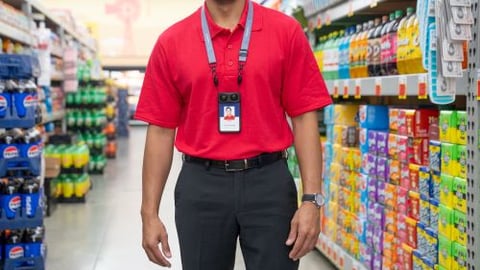Walmart Testing Body Cameras on Employees to Prevent Store Crime
Walmart has started giving store-level associates body cameras to wear as part of a pilot program at some of its U.S. locations, according to CNBC.
Walmart confirmed that it’s testing the technology in one market and will evaluate the results before making any longer-term decisions. A shopper in Denton, Texas, shared a photo of a Walmart associate wearing a yellow-and-black body camera earlier this month with CNBC.
Body cameras and the footage they gather are commonly advertised as a way to prevent shoplifting, but Walmart intends to use the tech for worker safety, not as a loss prevention tool, according to a person familiar with the program.
[RELATED: How Frustrated Are Shoppers With Items Under Lock and Key?]
As reported by CNBC, in a document titled “Providing great customer service while creating a safer environment,” staff are instructed on how to use the devices. It instructs employees to “record an event if an interaction with a customer is escalating” and not to wear the devices in employee break areas and bathrooms. After an incident occurs, staffers are told, they are to discuss it with another team member, who can help them log the event in the “ethics and compliance app,” according to the document.
Earlier this year, the TJX Companies said that it had also started using body cameras in its stores, which include its TJ Maxx, Marshall’s and HomeGoods banners. On a call with analysts after the company reported fiscal first-quarter earnings in May, finance chief John Joseph Klinger said that the devices had been effective in reducing shrink, or lost inventory.
The Landscape of Retail Theft & Violence
Walmart’s move comes as retailers reported a 93% increase in the average number of shoplifting incidents per year in 2023 versus 2019 and a 90% increase in dollar loss due to shoplifting over the same time period, according to a new study released by the National Retail Federation. Conducted in partnership with the Loss Prevention Research Council and sponsored by Sensormatic Solutions, "The Impact of Retail Theft & Violence 2024" study examined how theft and violence have evolved since before COVID and how retailers are combating today's retail crime landscape.
“Retailers continue to navigate a rising retail theft landscape that has evolved significantly over time,” said David Johnston, VP for asset protection and retail operations at Washington, D.C.-based NRF. “Protecting store associates and customers, coupled with reducing today’s levels of violence and retail crime, requires a whole-community approach and collaboration across all stakeholders.”
According to NRF's study, retailers surveyed experienced an average of 177 shoplifting incidents per day in 2023. However, that number can reach more than 1,000 depending on the retail sector. Lending Tree's recent survey found that shoplifters are more likely to shoplift from chain stores (52%) than local stores (28%), and that thievery is easiest in the grocery channel (46%).
As a result, many retailers have changed their strategies this year in an attempt to combat theft. Walmart has forgone self-checkout at several of its locations, as self-checkout has been found to be a major contributor to shrink. One of Walmart's stores in St. Louis, Mo., and another in Cleveland, Ohio, have seen their self-checkout kiosks removed in favor of adding more traditional checkout options. Other retailers that have recently made changes to their self-checkout strategy include Dollar General and Schnuck Markets Inc.
The Kroger Co. began performing periodic receipt checks at several locations in its Columbus, Ohio, and Cincinnati markets in an effort to curtail rising levels of theft, while Albertsons Cos.-owned Safeway installed high-tech security gates at the exits of some of its San Francisco- and Washington D.C.-area stores.
[RELATED: Behind Kroger’s Proactive Approach to Workplace Safety]
Yet violence remains a major concern for the retail industry. About three-quarters (73%) of those surveyed by NRF said that shoplifters are exhibiting more violence and aggression than they were a year ago, and 91% said that shoplifters are exhibiting more violence and aggression compared with 2019.
Compared with their last fiscal year, 71% of retailers have increased their budgets to support employee training related to workplace violence.
Among trade associations, the Pennsylvania Food Merchants Association (PFMA) has partnered with ZeroEyes, the creator of the only AI-based gun detection video analytics platform that holds the U.S. Department of Homeland Security Safety Act Designation. The pair will educate owners and workers at supermarkets, independent grocers, convenience stores and more about the effects of gun-related violence and how to minimize loss prevention.






